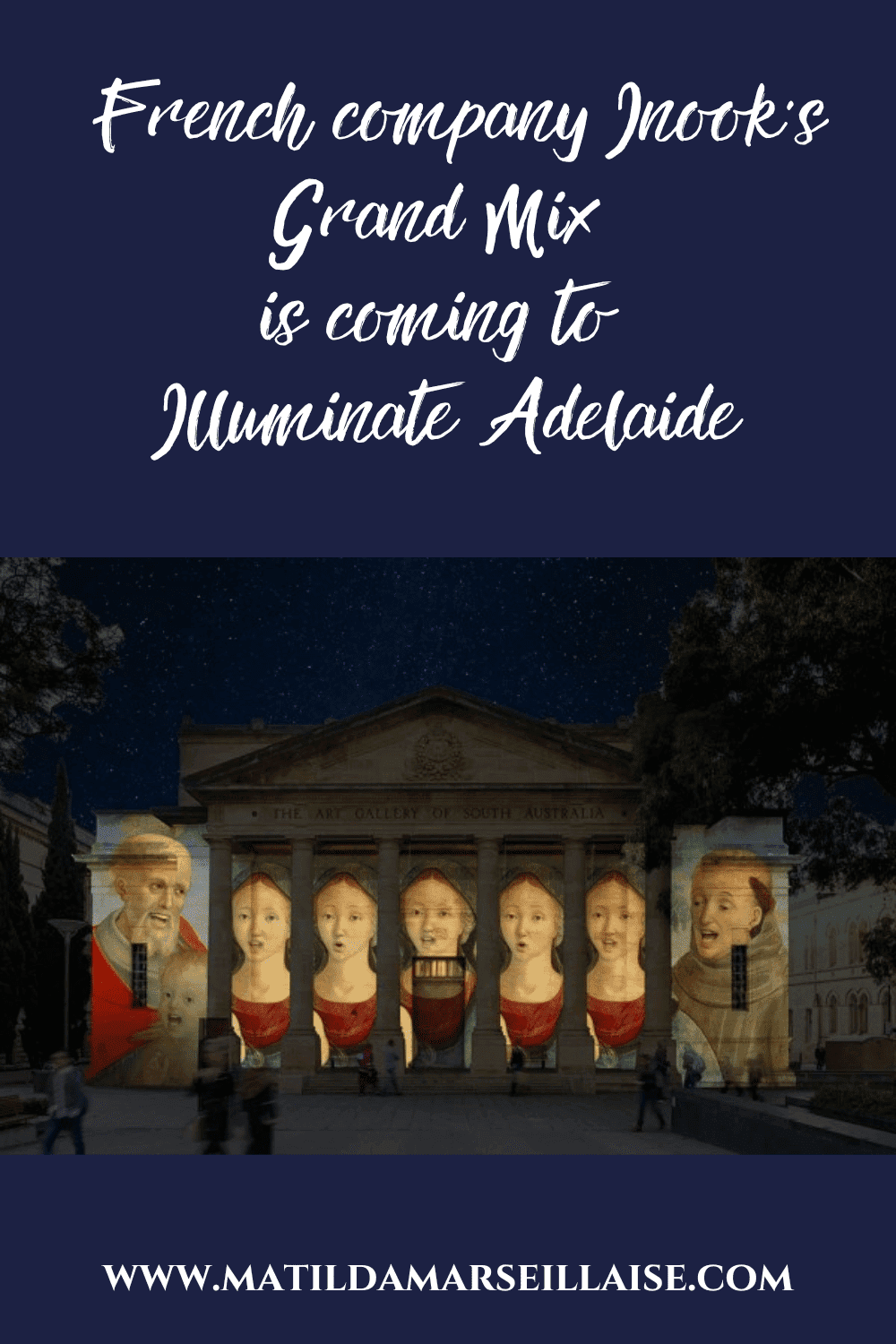Aurore Ghigo, was the ambassador for Bon Fromage 2024, a French cheese festival. She’s a cheesemonger with her own cheese business in Sydney called La Boîte à Fromages – Cheese on Wheels. We spoke to her about the Bon Fromage festival, her background and, of course, French cheese!

Aurore Ghigo, how long have you been involved in the cheese industry?
I started in 2011 in Sydney.
So you didn’t do it in France?
No, I went to hotel school in France. I came to Australia after I graduated and I worked in this cheese factory in Sydney and I worked for them for over 8 years. And in between I also moved to an organic and biodynamic farm in the Mid North Coast of NSW where I made cheese and yoghurt. I learned a lot about cheese. And then I opened my own business
Which is La Boite à Fromages/Cheese on Wheels.
Yes, so several French cheeses and Australian cheeses.
And do you make your own cheeses?
Not any more.
Why did you decide to get into the cheese industry?
I like cheese! I think that I had a I think I had a very particular interest in knowing where the product came from and how it was made, because it came from milk. I worked on a farm and the fact that I was looking after the cows from start to finish, seeing the finished product, I found that really interesting. So that’s why I was interested in learning about other cheeses and how they’re made, what their origins are, what their particularities are? So I guess I don’t know if it was cheese that chose me or if it was me who chose cheese! But there you go, I loved cheese, but it’s not just about eating cheese, it’s also about knowing where it comes from and why you eat that cheese at one time and not another.

Precisely, you’ve been conducting master classes at Bon Fromage on the subject of cheese for breakfast. You’ve introduced cheese into every meal.
And throughout the meal. I think it’s in France, it’s an element where we always have cheese. I remember that we eat camembert when we’re cooking because I remember eating a piece of comté or camembert while cooking. Cheese is more like a dessert if you don’t want a dessert, then there’ cheese to share. So I think a cheese for every occasion or, for example, when I’m sad, I eat white chocolate or cream cheese because it’s comforting, a little heavy but really comforting. So I think it’s really knowing that there’s a cheese for everything.
And the time you spent on our farms was for the 88 days (to get a second year of the working holiday visa)?
No, not at all. Not for that, I picked fruit.
I worked in Sydney in a cheese factory and then I worked for a while at the GPO where the lady who was in charge before me had this cheese and so I met David Marks. And he was so enthusiastic about his cheese, and we already knew each other, and the fact that I’m French … I had seen his philosophy and what he was doing, so my husband and I went and then we actually decided to stay. And we rented the house next door and worked. And we used to go to Carriageworks Market in Sydney every week on Saturdays, selling his yoghurts and cheeses.
Do you have any family in the cheese business in France?
No, not at all. They love cheese.
Any farmers?
No, not even that. I did the cow tour.
That makes a big change from hotel studies.
It’s a big change, but I think it’s really interesting. It was very interesting to see the size of Australia, where on the big farms, the “stations”, everything is very, very big, and here it was only 40 cows, and they all had a name. It was very small for Australia, but it was very precise about what we were doing and what he was doing, the end product.
And have you studied cheese since?
I haven’t taken any courses, but I read a lot. In France, we have CQPs, which are training courses with schools on how to cut cheese. I was trained at the hotel school, but I didn’t have any in-depth training, but I read a lot. I’ve met MOFS [les Meilleurs Ouvriers de France] when I’ve been to France several times, and they tell me that my knowledge is very, very good, because in absolute terms there are so many books, so much information…

Now to the Bon Fromage festival. It’s been running for 5 years in Sydney, I think.
In Sydney, yes.
And before that it was in Melbourne?
Yes, the first year.
Was this your idea?
No, no, it’s sponsored by the Centre National Interprofessionnel de l’Economie Laitière (the French Dairy Board). They were the ones looking for it. So I remember in Melbourne the first time we did it, we were contacted by a lady called Maria, from a company like SOPEXA, the company that looks after it. So it was a lady called Maria who had done it not twice, so the first time Melbourne was very small. It was really the first time. And then there was a second time in Sydney at Carriageworks, and then it was with SOPEXA.
And then there was COVID .
And then there was COVID in the meantime and that was different, so we had the first time with Xavier Thuret, who is a Meilleur Ouvrier de France [in 2007] who had come to Sydney. We had François Robin who is also a Meilleur Ouvrier de France [from 2011] who did Sydney, where I did it with him. That was in 2019, after which I did the International Cheesemonger Competition where I met other MOFs, so that was interesting.
A MOF is a Meilleur Ouvrier de France (literally Best Craftsman in France), isn’t it?
Yes, there’s just one per year in each category. After that, François Robin did an online masterclass from France and I did an online one the following year in which we did VIVE Cooking School in complete safety, and now we’ve got the re-format.
Apart from the COVID years, how has the festival changed?
I think people’s obsession with cheese is changing. I think COVID taught us to look at what was around us. I had a great craze during COVID for looking at small cheeses from local shops, and so people discovered other things and that you didn’t always have to go out and you could entertain at home and make a new dish. I think Australia is very cosmopolitan and very open, so it’s different from France. So I think there’s a craze for knowing how to enjoy good things that’s evolving.
So it was COVID that caused the change?
Not particularly, but I think it exacerbated the desire to get out and do something.
What are the challenges of putting on a festival like this with imported cheeses?
The purpose of the festival is to showcase cow’s milk cheeses, and it’s true that we like to compare things. For example, we’re not going to talk about goat’s cheese, or sheep’s cheese, so it’s really already an emphasis on cow’s cheese itself. Also, I think for them, it’s perhaps also to be sure that all the festival-goers who come, they get a dish with cheese, that it obviously reflects the cheese. And also to show the variety that even if it’s only cow’s cheese, there are so many varieties, like the difference between brie and camembert, double cream. People often think of hard cheese and blue cheese, but there are lots of varieties in just one category.
So you’ve been leading masterclasses of cheese with chocolate, and with morning coffee. Do you eat cheese with every meal?
Pretty much. A little. Some days I don’t eat cheese. Then there are days when I eat a lot because I’m in a bad mood or just want to eat cheese I think like chocolate, it’s addictive. I think you eat a bit of it, but sometimes you need a bit more, for example milk chocolate, I love that and as soon as there’s milk chocolate lying around in the kitchen, I eat milk chocolate.
There are days when I eat more cheese. Then I always have some cheese in the fridge and I’ll take a piece of bread and put some cheese on it while I’m cooking. Then I put the cheese back in its box. Some days you just want it. There’s a cheese for all tastes and for all occasions.

What’s your favorite pairing with cheese?
In cow’s cheese, because we’re talking about cows cheese of course, I really like Comté and Pinot. I did a very nice pairing at the Cheesemonger Competition. We sometimes have strawberry jam from Italy, with balsamic, so it’s a little sweet, but it’s very, very syrupy and a little acidic, and they have Swiss Gruyère cheese, which is also a little spicy, like Gruyère. I put it with meringues for crunch. If you want something that’s really out of the ordinary… It’s the sweet crunch of meringue with the acidity of this jam and the power of Gruyère.
I’m salivating!
Comté with this jam and balsamic. You can make it yourself. You take strawberries, sugar and balsamic and you cook them until they’re compote and the Comté with that is a good nutty Comté with the little dots of acid it’s too, too good!
Stop it! Do you have a go to cheese?
Comté. We did the master class on cheeses for the picnic, and I said that when you have people coming with a gathering, you always need one or two crowd pleasing cheeses. It’s always better to buy a piece or two. We say it’s 1, 3 and 5, but it’s always better to buy less but bigger than a lot and smaller, because you never know. But you also always have to make sure you have a Crowd Pleaser, a double cream brie, a comté, something you know everyone will like, and then you can look out of the spectrum, at things that are a little more different.
And is there a controversial cheese that you like to introduce to people? A cheese that people think they don’t like, or that’s a bit strange, different …
Epoisses because it stinks. And really that side of understanding how all the senses actually work. What’s interesting is the fact that you need all your senses to actually taste, and I always say “Give it a go!
Give it a go! It’s very Aussie. What’s the rarest cheese you’ve tasted?
The rarest? Donkey milk.
Donkey milk? Where?
In Italy.
I didn’t even know they did that. What was it like?
Nothing special. And casu martzu, which is a Corsican cheese with worms. But I remember a long time ago, when I was still in France, having a wedding and they had this cheese with this worm. But give it a go!
Drink a good tequila with the worm with it! And also, is there a cheese you’d like to try that you haven’t tried yet?
A cheese I haven’t tried yet, I don’t know because maybe I don’t know it. A cheese I’d really like to have in Australia is called Fébu, which comes from my town, where there are lots of cheeses. And it’s a bit like a raw-milk Saint-Nectaire.
Because raw-milk cheeses aren’t allowed in Australia.
Just uncooked rinds like Comté. But Fébu is a bit like Saint-Nectaire, it’s largely unwashed and very melt-in-the-mouth, it’s a delight. When I go to France, I bring back kilos of it in my suitcase.
Your suitcase would stink !
The suitcase stinks, but that’s okay!
So the theme of this year’s festival is cheeses through the seasons and how the seasons change cheeses. How do you know when you buy a cheese in Australia what season it’s from?
It depends on the Cheesemonger you have.

So for supermarket cheeses you can’t tell.
You can’t tell. But like the Comté, I say that if it has a very pale colour, it’ll be winter Comté. Whereas if it’s a little more yellowish in colour, it’s summer. The colour of the milk will change the colour of the cheese. Then we’ll see how Camembert cheeses are, so as they only have a few weeks of maturing, if we buy a winter cheese, we’ll know that it’s obviously made in winter. This applies a lot to hard cheeses, i.e. if, for example, you buy a 12-month Comté now, you know that even if it’s winter here, it would have been made in summer in France. Whereas if it’s summer here when we bought 12 months in Australia in January, it would have been made in winter in France. But if it was made in summer, we’d need an 18-month if we wanted to get that nutty taste.
And do you have a favorite season for your cheeses are made in?
The 36-month Comté from Chez Badoz. It’s made in summer and it’s a single cheesemaker. And he makes a Comté that’s magnificent, and I’m lucky to have a very good exporter in France who chooses them. He knows what I like and for years I’ve asked for the same water number [which refers to the percentage of water present in a cheese] and every time it’s the water number I wanted the same one the year after. So he knew what I wanted.
And how do you go about importing them? Does it come in a container or by plane?
By plane for all the soft cheeses and blue cheeses and for anything else that’s not a hard cheese, it’ll come by refrigerated ship. Then you have to do the paperwork.
Is there any message you’d like to pass on to the people who come to Bon Fromage?
Give it a go. I think it’s try.
Give it a go.
Give it a go. I think it’s important when you go to the cheesemonger. When people come into my store, I ask them lots of questions. What do you like to drink? What do you like to eat? They stare at me. If you tell me that for example, I love Chinese food and I love Syrah, you like anything spicy, that’s something that’s going to have flavoir. So I can give you a Swiss cow’s milk cheese like Roka. If you tell me I’m very European like me, for example, I don’t really like cheeses that are too strong except for Epoisses, which I like. After all, everyone’s different, but for example I’m more into Pinot, red wines that are very light and not spicy.
So in the version for cheeses that are too strong for me it’s too strong, I’ll prefer cheeses like Brillant à Saint-Marin or Comté; things that are a little simpler, a little easier for my palate. But try it, it’s important and when you go to the cheese shop, it’s to be sure that you’re choosing something that you’ve chosen yourself, that you will taste, that you will like.
Taste before you buy
Always.
What do you think of Australian cheeses compared to French cheeses?
There are some very good Australian cheeses. I’m not talking about Brie and Camembert, which are exactly the same thing, far from it. But I think what’s good about Australia is that they’re trying out new techniques. In France, we do things very, very well, but the fact that we can adapt here in Australia and we’re still discovering. So I think this discovery side because we have a cheesemaker in Melbourne called Ivan Larcher who has worked a lot in France. He has his own cheese dairy, he makes a lot of cheeses for other companies and he has a cheese school in Castlemaine, and even he’s still discovering because the milk is different, the cows are different, the composition changes and even for the cheese, it’s not like in France where we use the same herd of cows. So there’s still a bit of a discovery side to it, and even he, who’s super-experienced, is still discovering how to adapt recipes, and I think that’s actually not a bad thing.
—
We would like to thank Aurore Ghigo and the Bon Fromage festival for this interview.
Do you want to know more about Bon Fromage? Read these articles:
You’ll be bleu if you miss the brie-lliant free three day Bon Fromage Festival 2024 in Sydney
The Bon Fromage 2024 free masterclasses program just got bigger!
If you want to buy cheese from Aurore Ghigo, you have 5 locations in Sydney to do so! Check out La Boite à Fromages/Cheese on Wheels’ website to find our where and when.
Follow European Cheese Australia on Facebook to discover European cheeses and cheesy recipes.
For events with links to France and the Francophonie, check out our What’s on in June
And if you want to read more articles about cheese, here they are:
Cheese Soufflé Day 2024: 10 facts and some French wine pairings
Which French mouldy cheese to eat for Moldy Cheese Day tomorrow
Fondue Day is Sunday but what do nuns have to do with fondue?
Cheese Lovers’ Day: cheese subscriptions
Sonic Seasoning: Valerie Henbest talks to us about all things cheese and music






